NBA Midseason Awards: The Case For Darkhorse Candidates

Most of the major NBA award races haven’t seen significant movement since SI made its first-quarter picks in mid-December, so it’s time to try something a little different now that 2016–17’s midway point is in the rearview.
Instead of relitigating the same old debates (Russell Westbrook or James Harden?) or rehashing the no-brainers (Joel Embiid), let’s examine some of the top darkhorse candidates who deserve some love even if they’re currently lurking outside the spotlight. Will any of these players and coaches close hard enough down the stretch to disrupt February’s conventional wisdom? Which favorites, and what factors, will stand in their way?
To determine a consensus favorite for each award, SI surveyed its staff of basketball writers and editors. Note: all stats and records are through Jan. 31.
NBA Midseason Grades: Western Conference
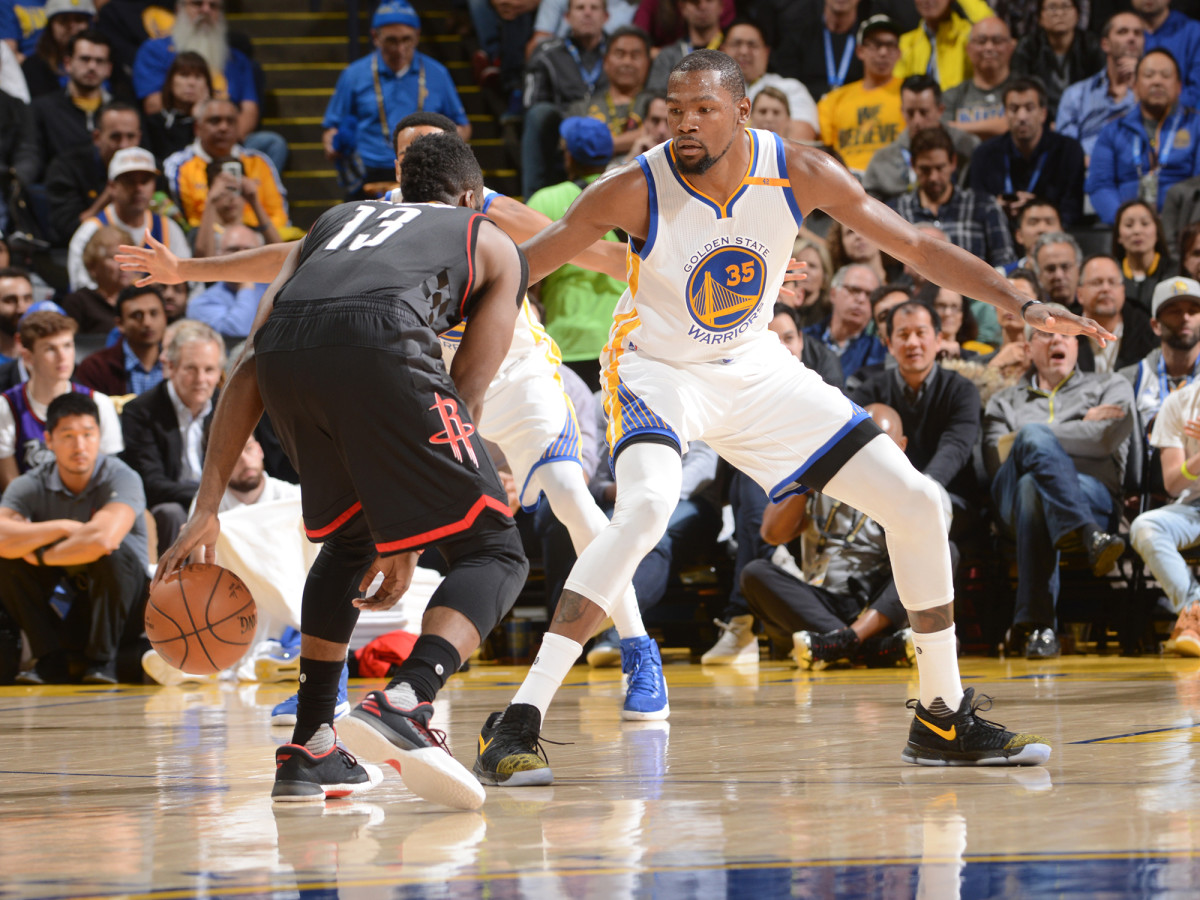
Most Valuable Player
SI Consensus Pick: James Harden, Rockets
Darkhorse to Watch: Kevin Durant, Warriors
The MVP horserace is right on track so far: Harden has pushed in front of Westbrook in the battle of insane individual producers, with Houston’s superior team success serving as a key tiebreaker for many analysts. Harden was, deservedly, the overwhelming selection in SI’s straw poll: he’s made 50-point triple-doubles a thing that need to be tracked, he’s posting stats not seen since Oscar Robertson, he’s guided the league’s biggest surprise team and its most futuristic offense, and he has the Rockets on a 57-win pace (well ahead of the Thunder’s 48-win clip). His case will surely be aided by memories of his 2015 MVP runner-up showing and his easy-to-digest bounceback story after Houston’s rotten 2015–16 season.
Let’s not write off Durant just yet, however, even if his candidacy requires acknowledging a few weaknesses up front. Yes, Durant jumped ship to a stacked team. Yes, he has far more help than either Harden or Westbrook and therefore can’t match their mind-blowing per-game numbers. Yes, Golden State isn’t quite matching its record pace from last year. Yes, Durant’s scoring is down considerably from his 2014 MVP campaign, given that Golden State doesn’t need the same heavy lifting he performed in Oklahoma City. And, yes, he has endured some early-season struggles late in games.
Voters willing to look past Durant’s off-season decision—and to judge him against Harden and Westbrook rather than holding him to the standard set by 2016 Stephen Curry and the 73-win Warriors—will find a deep and compelling case. Durant is the best player on a team that has a chance to post the best point differential ever and become just the third 70-win team in NBA history. He is an obscenely efficient offensive weapon and the leading scorer for the league’s best offense. He is a much-improved defensive player for the league’s best defense whose impact on that end far exceeds both Harden and Westbrook. And he’s been such a clean fit in Golden State that his statistical decline is easily explained by his reduced minutes and usage, and the Warriors’ regular habit of blowing teams off the court.
The following chart of the NBA’s top 50 scorers helps put Durant’s scoring volume (Points Per Game) and efficiency (True Shooting %) into context.
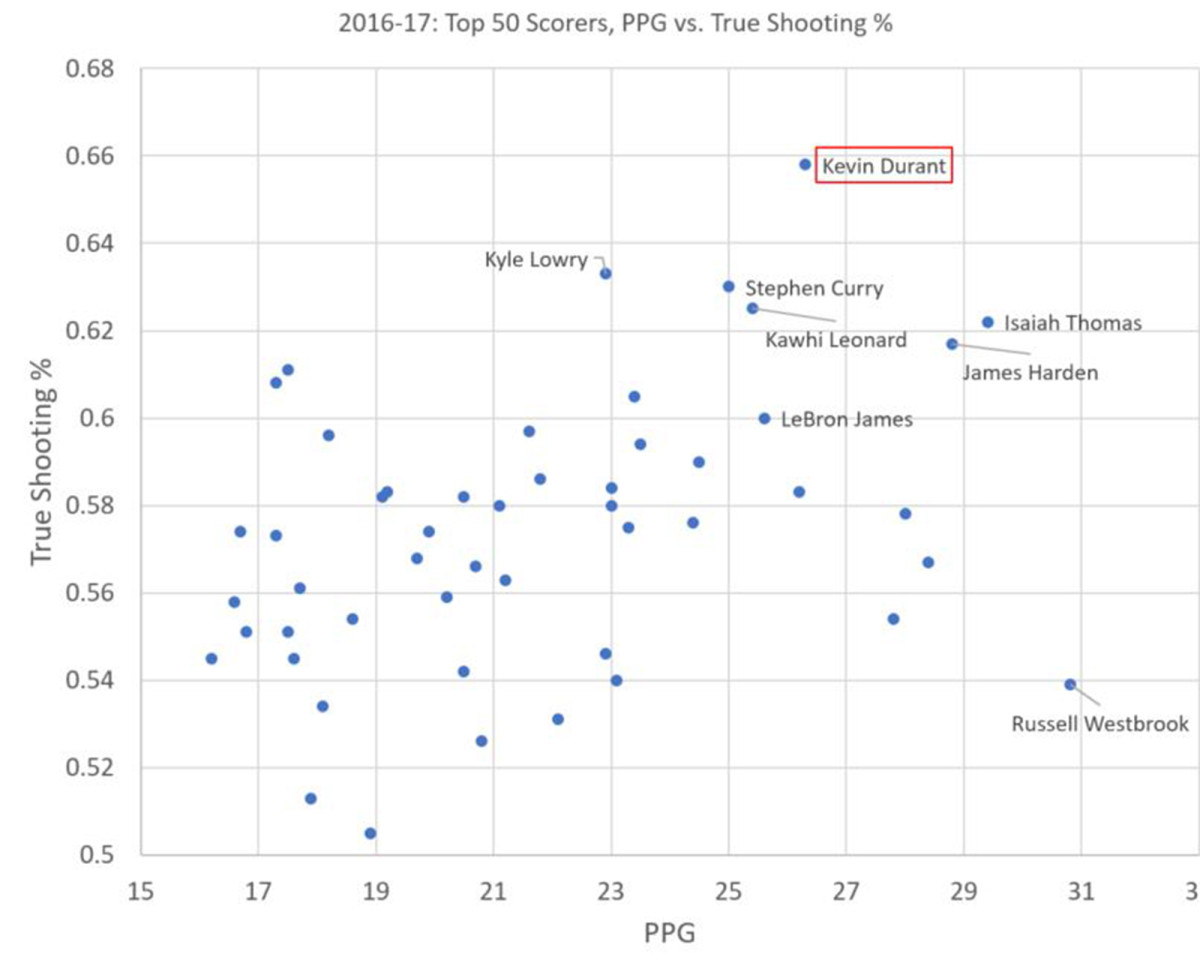
Durant’s 65.8 TS% is tops by a wide margin. Remarkably, Durant is both scoring more and shooting more efficiently than Curry, who has become the gold standard for this volume/efficiency comparison in recent years. Indeed, the only player since 1990 to best Durant’s scoring volume/efficiency combination was Curry during his record-busting 2015–16 season, when he was unanimously voted MVP. So, great company.
Defensively, Durant has made some noise in a good way, too, posting a career-best 1.7 blocks per game and managing to be one of just nine players to average at least one steal and one block per game. Golden State currently possesses the NBA’s best defense (Oklahoma City is tied for seventh and Houston is tied for 19th) and, per NBA.com, Durant’s interior defense stats (57.5% allowed on 21.6 attempts per game from within five feet) are similar to Defensive Player of the Year candidate Draymond Green’s (57.1% on 20.7 attempts). Right now, Durant’s 1.87 Defensive Real Plus Minus (DRPM) bests both Harden (-1.22) and Westbrook (0.03) and he ranks third in Defensive Win Shares behind only Jazz center Rudy Gobert and Green.
That got pretty dense. Let’s zoom back out and take a look at history. While plenty of attention has been given to Westbrook’s triple double output and Harden’s insane 28.8 PPG/8.2 RPG/11.5 APG line, Durant is cooking up a unique line himself thanks to his defensive statistics.
Here’s the list of players who can match Durant’s 26.3 PPG/8.4 RPG/4.7APG/1.7 BPG/1 SPG line in all five categories…
• 1974 Kareem Abdul-Jabbar: MVP
• 1976 Kareem Abdul-Jabbar: MVP
• 1994 David Robinson: MVP Runner-Up
So, again, great company.
Will Durant’s unique package of skills and Golden State’s success be enough to move him past both of his former teammates? That remains to be seen. But it should be awfully hard to ignore him if he finishes the season as the best player on a 70-win team, with a convincing case as the best two-way performer among the top three candidates, and with all-around statistics last season more than 20 years ago.
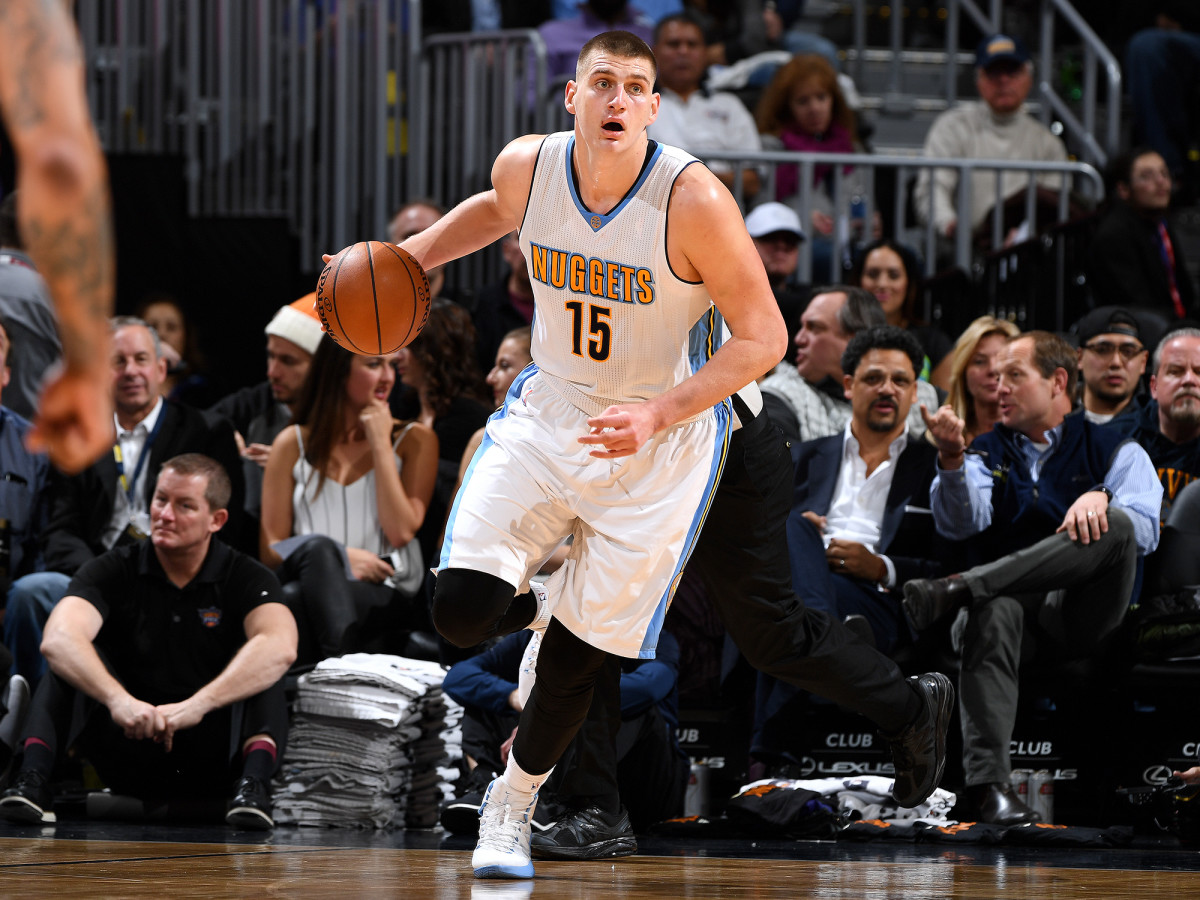
Most Improved Player
SI Consensus Pick: Giannis Antetokounmpo, Bucks
Darkhorse to Watch: Nikola Jokic, Nuggets
There’s still not much debate to be found here: Antetokounmpo’s production remains up across all the major statistical categories, his advanced numbers agree with the eye test that he’s just ridiculously awesome, and the Bucks remain in the playoff mix despite a recent swoon.
Let’s treat this runaway, then, as an opportunity to throw some honorable mention attention to Jokic. Denver’s 21-year-old center is playing catch-up thanks to coach Michael Malone’s curious decision to bring him off the bench for much of November and early December. Since returning to the starting lineup, Jokic has played like a borderline All-Star, averaging 23.9 PPG, 11.1 RPG and 4.8 APG in January. As with Antetokounmpo, this isn’t just about the numbers. Jokic’s blossoming has helped given Denver hope and a crack at establishing an identity (a fun one, to boot!) for the first time in years.
Giannis Antetokounmpo: The Most Intriguing Point Guard In NBA History
From both the vision and execution standpoints, Jokic has already established himself as one of the NBA’s best passing big men. He plays his teammates into space beautifully, he anticipates the action before it happens like a point guard, and his mobility allows him to pick apart opponents from well outside the painted area. He clearly makes his cast of fairly limited teammates better, whether it’s creating high-percentage looks for guards off of cuts or setting up a garbage-man finisher like Kenneth Faried to do what he does best.
With Jokic on the court, Denver’s offensive rating improves by 10 points, the type of impact usually associated with elite playmakers. What’s more, the Nuggets are currently sitting in the eighth seed, a modest accomplishment given the state of the West but no small feat given Gary Harris’s early-season injury and Emmanuel Mudiay’s often unsightly contributions. The next developmental steps for Jokic are clear: Ramp up to true starter’s minutes, prove that he can maintain his strong efficiency (No. 10 in Player Efficiency Rating) and impact numbers (No. 14 in RPM), and get the Nuggets’ 29th ranked defense into more respectable territory. There’s plenty of time for all of that.
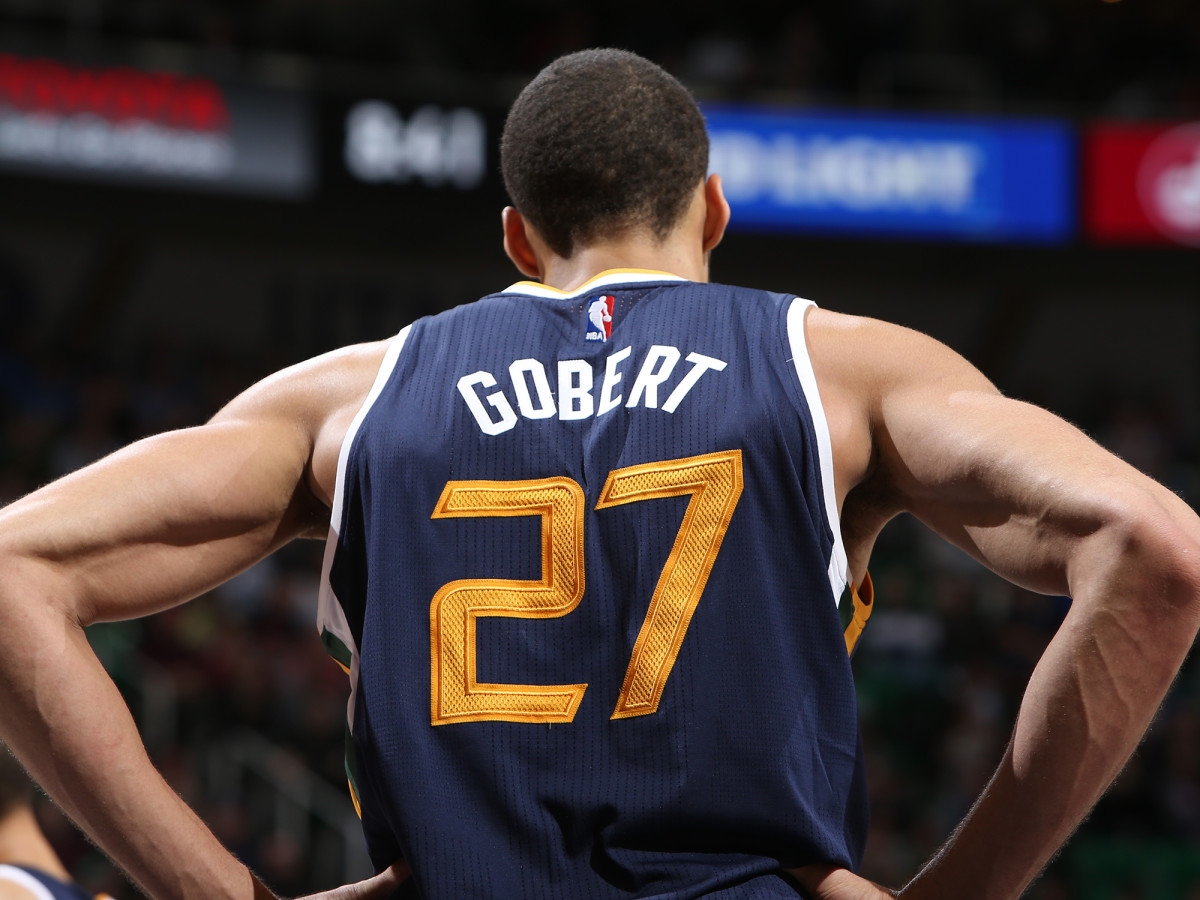
Defensive Player of the Year
SI Consensus Pick: Rudy Gobert, Jazz
Darkhorse to Watch: Gobert
Here’s one where SI’s internal consensus selection of Gobert probably doesn’t match the actual consensus, which almost certainly would go to San Antonio’s Kawhi Leonard (the 2015 and 2016 DPOY) or Golden State’s Draymond Green (the 2015 and 2016 DPOY runner-up). It’s safe to call Green the midseason favorite, given the Warriors’ No. 1 ranked defense and the fact that this award has often gone to the best defensive player on the league’s best defense. Indeed, Gobert himself wrote on Twitter this week that the media has “already decided who the DPOY is” and that he will “keep controlling what I can control and keep helping my team win games.”
Frankly, Gobert will remain a darkhorse until voters prove that he isn’t. The French center was snubbed from this year’s All-Star team, despite an excellent case. And he also drew just two first-place votes in the last two DPOY races combined, although a knee injury slowed his growing momentum last year.
There are plenty of ways this could end with Gobert taking home the honors. His statistical case is extremely strong, as he leads the league in blocks, defensive rating, Defensive Win Shares and DRPM, while ranking fifth in rebounds. What’s more, Gobert’s singular success as an interior defender has guided Utah to the league’s No. 2 defense.
Ranking The Top 10 Snubs From The 2017 NBA All-Star Game
The real meat of Gobert’s DPOY argument is similar to Harden’s MVP argument over Durant: he’s done as much (or more) with significantly less help than his competition. Whereas both Green and Leonard play on deep, experienced and stable teams, Gobert has carried an up-and-coming Jazz team into the playoff picture for the first time since 2012 despite line-up absences at virtually every position around him. Gordon Hayward missed time to start the season. George Hill has missed roughly half of Utah’s games. Rodney Hood and Derrick Favors have both missed at least 10 games. If Gobert hadn’t enjoyed perfect health, the Jazz would be nowhere near the top of the Northwest Division, even with Hayward playing at an All-Star level.
Hopefully, the word continues to spread about Gobert as the second half of the season unfolds. This will almost certainly remain a three-horse race barring an injury or an unexpected turn of events. The East’s three top teams—Cleveland, Boston and Toronto—all lack strong individual DPOY candidates this year and Chris Paul’s injury will likely keep the Clippers from finishing with a top-five defense. The rest of the West’s second-tier is unlikely to produce a candidate except for perhaps Memphis’s Marc Gasol. Gobert’s best bet for overcoming his name recognition advantage is if Utah finishes as the NBA’s best defense and with the West’s third seed and, even then, it might not be enough.
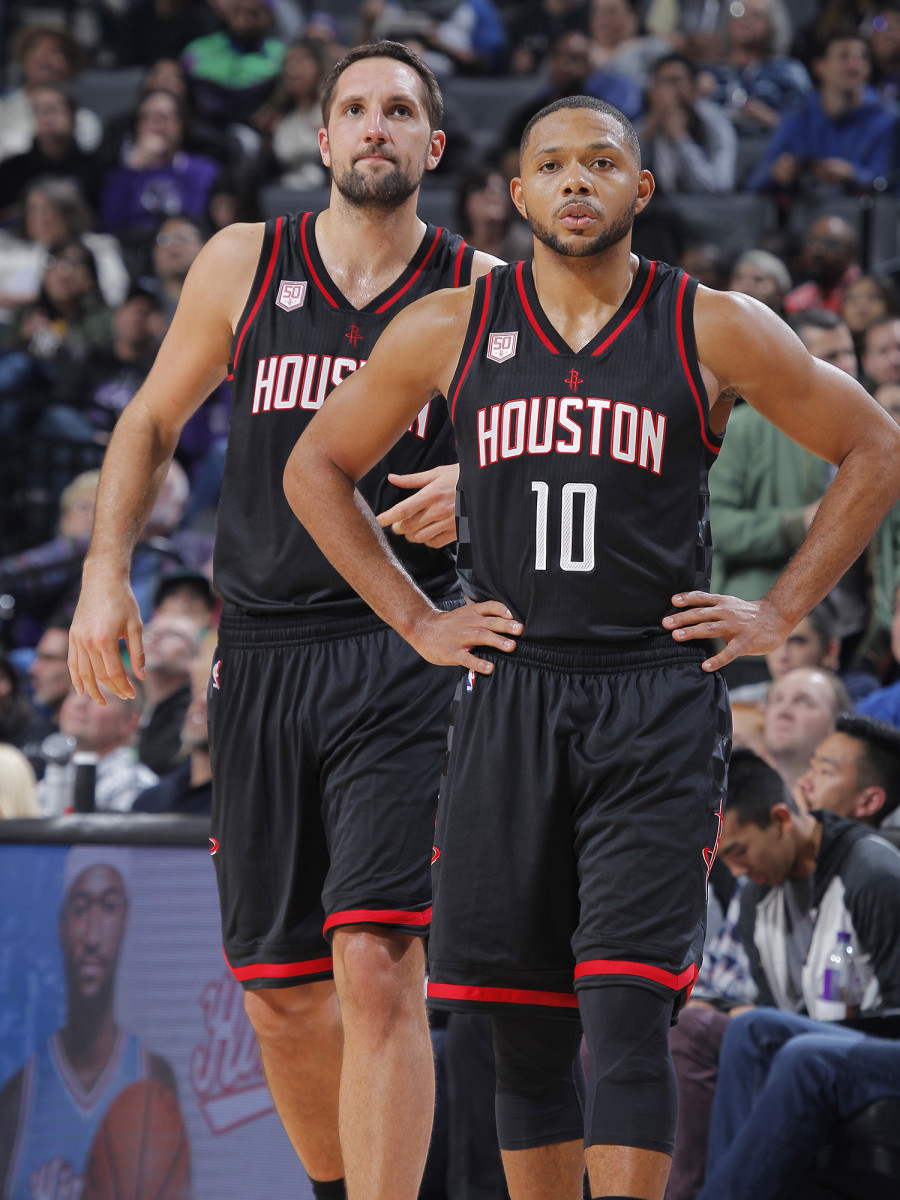
Sixth Man of the Year
SI Consensus Pick: Eric Gordon, Rockets
Darkhorse to Watch: Lou Williams, Lakers
Gordon looked poised to run away with this award and even generated some brief (overly optimistic) All-Star buzz until he hit some tougher times in January. His case nevertheless remains strong: he’s averaging 17.3 PPG, he’s shooting 38.8% from deep while launching more than nine threes per game, he’s a crucial cog in one of the NBA’s best offenses, and he plays a highly-visible role in holding down the fort when Harden is off the court.
Just to quickly drive home the point on Gordon’s crazy impact: he’s the only player besides Curry (last year and this year) to attempt nine threes per game, and he’s connecting at well above the league average rate of 35.9%. As far as one-trick ponies go, it doesn’t get much more useful and deadly than that. Plus, while Gordon’s own free-throw numbers and passing stats leave something to be desired, his ability to space the court off of Harden offers secondary benefits. When Gordon and Harden play together, Houston’s offensive rating shoots up to 113.6, on par with Golden State’s league-leading attack. Harden just has that much more room to do his thing.
Williams was selected as the darkhorse here not so much for his production with the Lakers but for what he might do for another team after the trade deadline. As it stands, putting records aside, Gordon versus Williams is close by the numbers.
• Gordon: 17.3 PPG, 42 FG%, 38.89 3P%, 2.8 APG, 2.7 RPG, 14.8 PER, 1.58 RPM
• Williams: 18.2 PPG, 43.7 FG%, 37.9 3P%, 3 APG, 2.3 RPG, 23 PER, 1.71 RPM
Road To Recovery: Inside The Resurgence Of Eric Gordon And Ryan Anderson
With numbers that close, the Rockets’ superior record and compelling story is sure to serve as a tiebreaker in Gordon’s favor. There are also some bigs on relevant teams—Greg Monroe, Zach Randolph, Enes Kanter (if he hadn’t been KO’d by a folding chair) etc.—who might get some love from the voters.
Williams is the wild card in this race, though, because he’s such a clear trade chip. Let’s list the many reasons he should be moved to a contender. One: The Lakers need to race to the bottom of the standings to keep their top-three protected pick. Two: they have multiple young high-usage guards in the fold and may add another one in the draft. Three: Williams is a known quantity whose shot-creating skills plug-and-play into any bench unit. Four: Williams is on a very tradable contract that pays him $7 million this year and next. Five: A bunch of playoff hopefuls—the Wizards, Pistons, Bulls, Thunder and Kings—are currently getting average or below-average bench scoring production. While Williams has his flaws like many one-way bucket-getters, he’s about as reliable as Sixth Man scorers come these days. He’s also no stranger to the postseason, with more than 1,000 playoff minutes to his name. Will someone liberate Lou-Will from Lakerland for a postseason push and give him the opportunity to counter Gordon’s “Off-season addition who helped Houston turn things around” card?
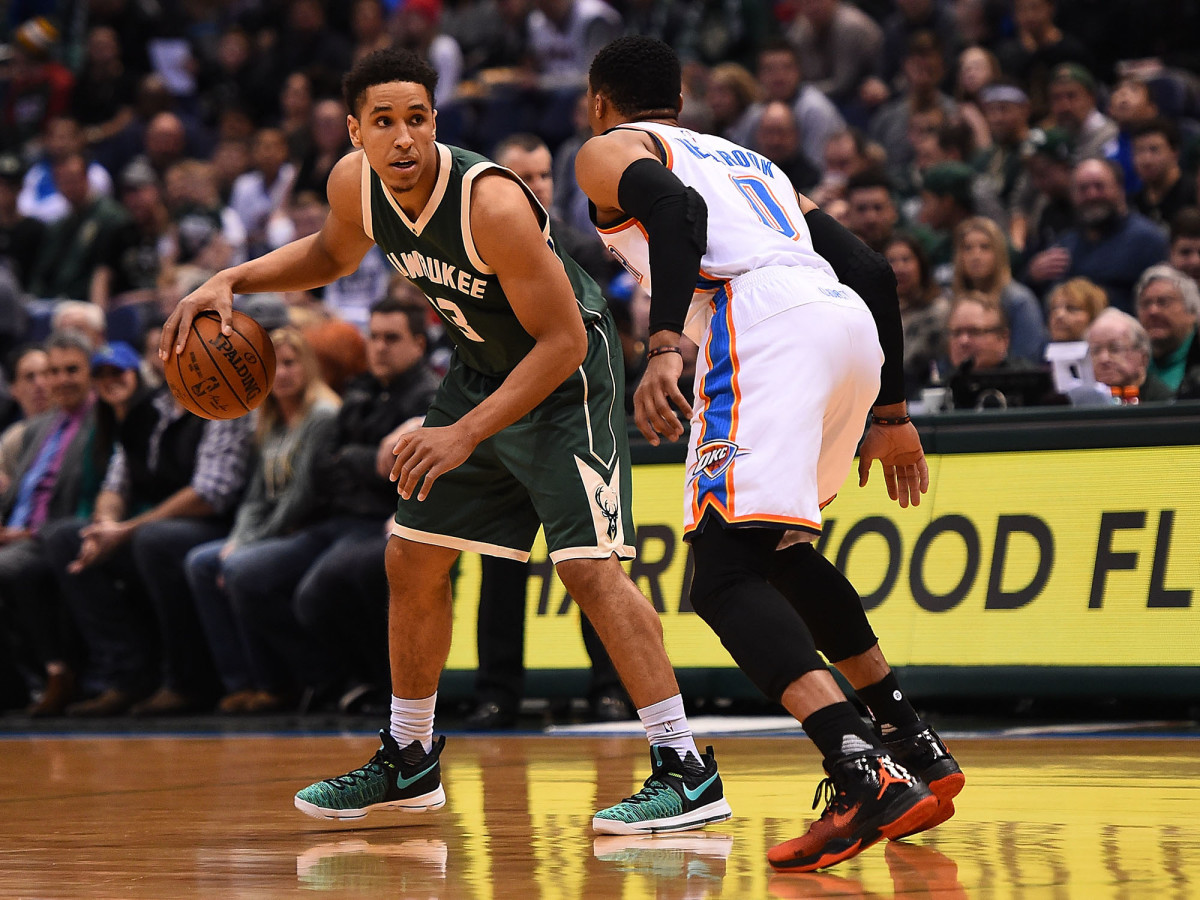
Rookie of the Year
SI Consensus Pick: Joel Embiid, Sixers
Darkhorse to Watch: Malcolm Brogdon, Bucks
There’s a very, very, very strong chance that Embiid, the SI panel’s unanimous selection at the midpoint, will play the fewest minutes of any Rookie of the Year winner, including players who won in lockout-shortened seasons. As it stands, Kyrie Irving’s 1,558 minutes during the 66-game 2011–12 season stands as the benchmark. Embiid, who has missed 16 games already and has yet to log 30 minutes in a game as he returns from multiple season-ending injuries, is on pace for 1,432 minutes.
For Embiid, the quality of his production more than makes up for the lack of quantity. When he’s off the court, Philadelphia’s defensive rating is roughly the same as Portland’s 25th ranked defense. When he’s on, Philadelphia’s defensive rating is better than Golden State’s No. 1 ranked defense. In other words, Embiid has been the difference, on defense, between pathetic and sensational.
The rest of the NBA simply hasn’t adjusted to his rare combination of size, quickness, length, timing and natural shot-blocking instincts. Embiid’s overall 40.9% Defensive FG% is nearly identical to Gobert’s. When it comes to defending shots from within six feet, his 43.9 Defensive FG% is the best among all players with at least 100 attempts defended, besting the likes of Kristaps Porzingis, Gobert, and Roy Hibbert.
NBA Midseason Grades: Eastern Conference
Meanwhile, Embiid has been a terror on offense as well, dunking, drawing attention, drilling threes, and parading to the foul line. His offensive impact hasn’t been quite as dramatic as his defensive impact, given that he’s more reliant on Philadelphia’s weak talent for help on that end, but his numbers (20.2 PPG, 7.8 RPG) are still blowing away the competition. Given an all-around portfolio that landed Embiid on the All-Star snubs list and an incredibly weak early showing from the 2016 draft class, entertaining any other candidate for this award amounts to flirting with an unthinkable misstep for The Process. Although, as crazy as it sounds, Embiid has done enough to deserve ROY even if never played another minute this season.
With that in mind, view Brogdon as the darkest of darkhorses, a four-year guard who deserves attention for outperforming his No. 36 draft position and playing a sizable role for a team with playoff aspirations. The University of Virginia product leads his class in MPG, points, assists and Win Shares, and he’s improved the Bucks’ offensive and defensive ratings when he’s on the court. While No. 1 pick Ben Simmons has yet to debut and No. 2 pick Brandon Ingram is suffering through serious growing pains, Brogdon has made himself useful, playing both on and off the ball, shooting consistently from deep in limited quantities, and alternating between starting and bench roles. Given that six players selected before him have yet to play in an NBA game—and another seven have logged fewer than 100 minutes—fits the bill as 2016’s top second-round steal.
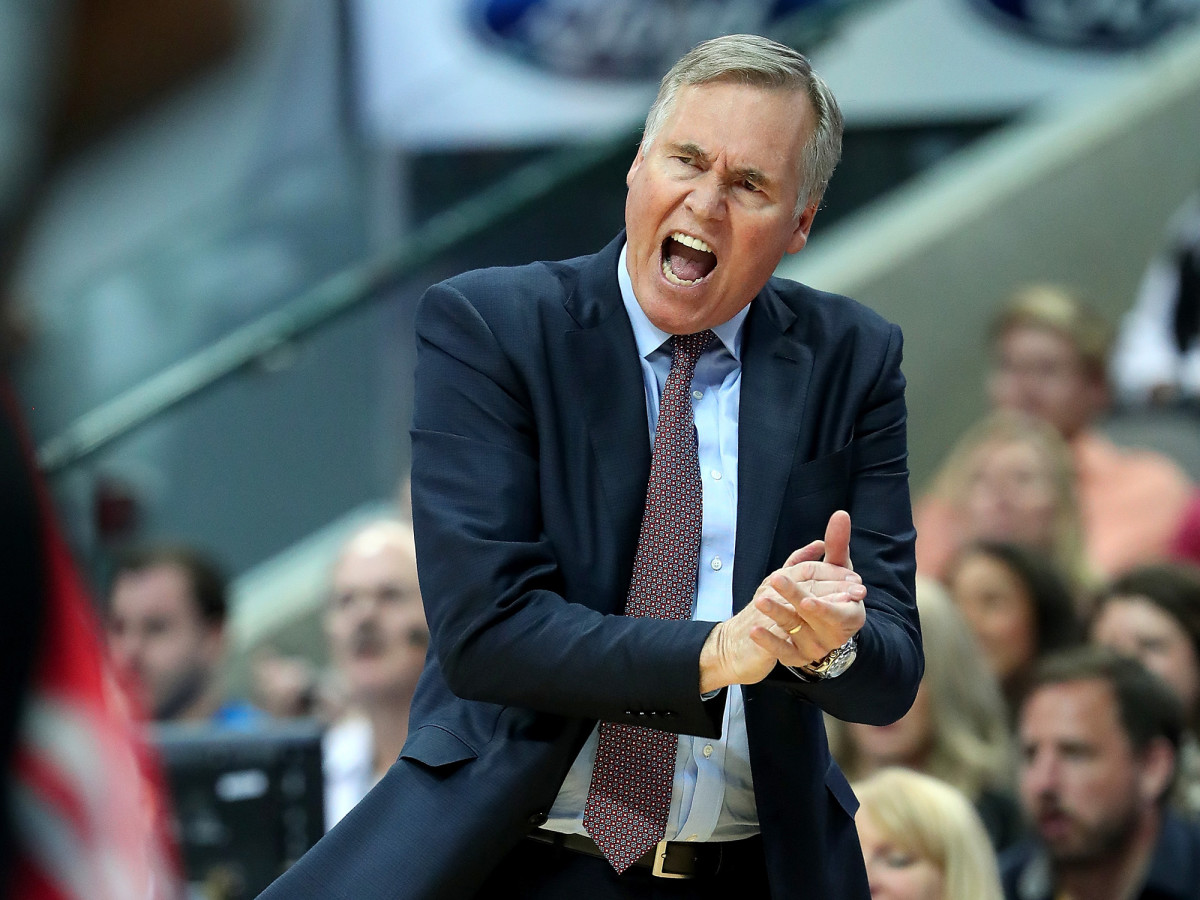
Coach of the Year
SI Consensus Pick: Mike D’Antoni, Rockets
Darkhorse to Watch: Scott Brooks, Wizards
D’Antoni has separated himself as the midseason favorite on the strength of Houston’s overachieving: the Rockets are on pace for 57 wins, a full 13 above their preseason over-under of 44. Unless Brett Brown somehow pulls the Sixers all the way out of the muck and into the East’s playoff picture, it’s hard to see any coach beating D’Antoni when it comes to surpassing expectations. Throw in his functional relationship with Harden, his status as a new hire, and his captivating offense, which continues to break new ground more than a decade after he was named COY in Phoenix, and D’Antoni’s case looks rock solid. It also helps that Steve Kerr and Gregg Popovich both won COY recently. D’Antoni’s story is compelling, it’s easy to tell, and it’s “new” (relative to the teams above his Rockets in the West).
As the season has unfolded, though, D’Antoni might have been surpassed by Brooks in the “How the hell?” department. Back in November and December, it was still strange to see the Rockets play with such explosiveness, consistency, cohesiveness and commitment. Now? That’s become the standard.
The Wizards, however, have been Dr. Jekyll & Mr. Hyde within the same season, Brooks’s first on the job. Washington opened with a 2–8 start and played like a team that hated each other. The tide turned in early December, as John Wall and Bradley Beal started playing like a pair of stars, rather than two talented players on the same team, and Otto Porter managed to keep performing like a Most Improved Player candidate. Since Dec. 5, Washington boasts the NBA’s No. 6 offense and No. 8 defense. Even more impressively, the Wizards are 22–8 in that span, ranking third in winning percentage behind only the Warriors and Spurs.
Even factoring in the slow start, Brooks has Washington’s offensive efficiency at heights never before seen during the Wall Era. He’s also got the Wizards’ starting lineup, which is full of competing interests and big personalities, posting a beautiful +11.3 net rating. On top of all that, he’s got the Wizards’ defense performing better than last year despite the shakiest possible bench and an injury that has limited Ian Mahinmi, a key offseason signing, to one appearance all year. With the right trade deadline move and continued good health for the starters, a run at the No. 2 seed has somehow, someway become a reasonable goal.
That best-case scenario, one that seemed completely implausible a month ago and may still fall apart at any moment due to Washington’s lack of depth, would turn Brooks into a real Coach of the Year rival for D’Antoni. It feels incredibly strange to type those words.
